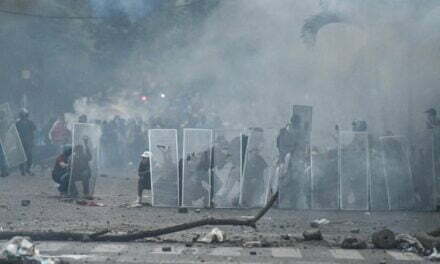
The Strangled Heartbeat of Hong Kong
A once vibrant city, renowned for its merging of East and West, Hong Kong is now shadowed by a suffocating cloak of repression. The ruthless grip of China’s Communist Party has not only silenced dissent but has also smothered the freedom and human rights that once defined this global financial hub.
In a haunting echo of their chilling tactics, the Hong Kong authorities announced bounties on democracy activists now living as exiles. John Lee, the territory’s chief executive and a former police officer, warns these activists they will “spend their days in fear.” His threats are not empty; police have harassed and interrogated family members of these exiles, proving the lengths they’ll go to suppress opposition.
With the 26th anniversary of Hong Kong’s return to China also marking the third year since the implementation of the stifling National Security Law, the deterioration of rights is palpable. Today, there are over 1,500 political prisoners in Hong Kong’s prisons. Heartbreakingly, half of these are young souls under the age of 25.
Yet, the transformation of Hong Kong from a symbol of liberty to a pawn of authoritarianism provides lessons for the free world:
1. The people of Hong Kong were beguiled by the Chinese Communist Party’s promises. They believed too deeply in the “one country, two systems” ideology and failed to notice the creeping influence of the Communist Party, leading to the deterioration of freedoms.
2. Overconfidence blinded the residents. Massive protests exhibited unity, but internal fractures and the presence of government loyalists weakened the movement from within.
3. Expectations of international support were overestimated. The world might condemn the repression, but actionable intervention is often limited. Real change will depend on the tenacity of Hong Kong’s people.
4. The international community, especially Taiwan, must recognize and learn from the tactics employed by the Chinese Communist Party to infiltrate and dominate. It’s a calculated game: granting autonomy temporarily, sowing discord within opposition ranks, manipulating perceptions, and finally, revealing their true authoritarian nature, as seen with the 2020 National Security Law.
As we consider the plight of Hong Kong, it’s crucial to remember that this isn’t just about one city’s loss of freedom. It’s a mirror reflecting the tactics of a regime that could target other free societies. Hong Kong stands as a dire warning: complacency in defending freedoms will only empower authoritarian forces. The lessons Hong Kong offers are hard-won and must not be forgotten. If we neglect them, the relentless silkworm of the Communist Party could continue its quiet devastation of the free world.
























Hong Kong is one of my favorite places on Earth. I was there on the eve of the handover and the only thing we noticed were men in green suits with guns. Looked like Florida today in that regard. Nothing was changed, no one seemed worried. What I love most about Hong Kong is the people. Well, that and travelling the same streets as Jackie Chan (which I did). Funny story on that one. Their culture seems to be of two minds: UK and China which makes them a unique blend of Eastern and Western thinking. And IMO this makes them a powerful force different from anywhere on Earth. Fun people too, but I had to watch the drinking, might give away the store :>) As I was there with the green-suited men, we were shittin our drawers given we were in a legal gray area stretching the legalities of the internet and secretly installing a server on the mainland (in a chicken coop basically). I could not go, speaking early the next day and had a relative on the mainland and did not want to risk here over my playing around. Many great stories from there over the years. The old airport was also one of the better sky rides too, oh my.
Today, much more than the airport has changed, much has not. Many international hubs have left, however, is it Beijing or was it covid? Beijing is clamping down on the political and communications fronts but not so much so on the business sector. They have to know those folks are fairly mobile being able to escape if things change there. Most of the upper crust is pretty global so if China pushes them out, China and Hong Kong will lose a lot.
Not sure where Beijing wants to take this, but if they screw with the economics, it will not end well. And, for Taiwan, it’s obvious that Chinese rule means the end of their government of “unitary parliamentary constitutional republic under a semi-presidential system” whatever that is. As to the business sector, that story is still being written but so far, looks livable, just not sure how much more they will take.